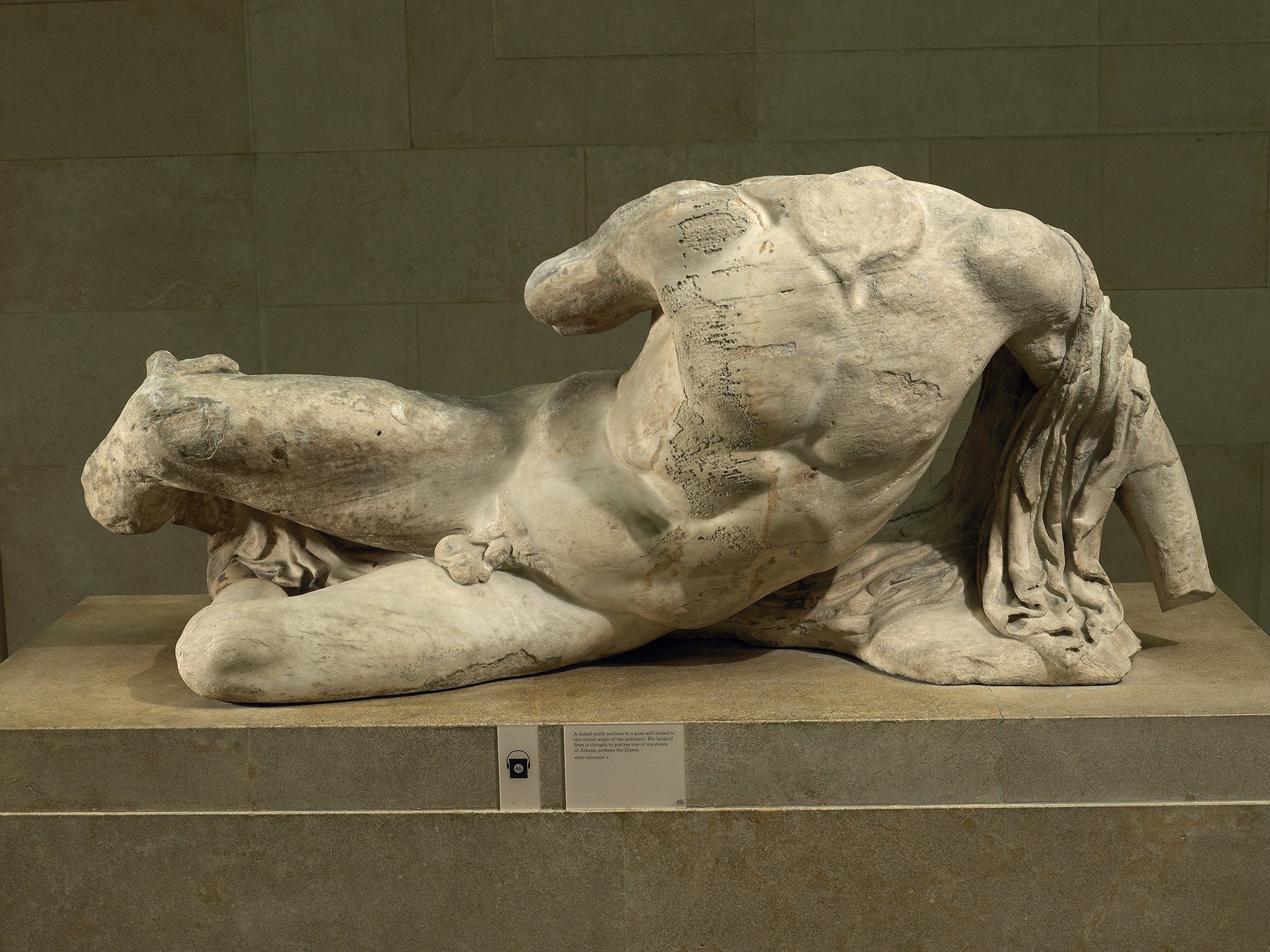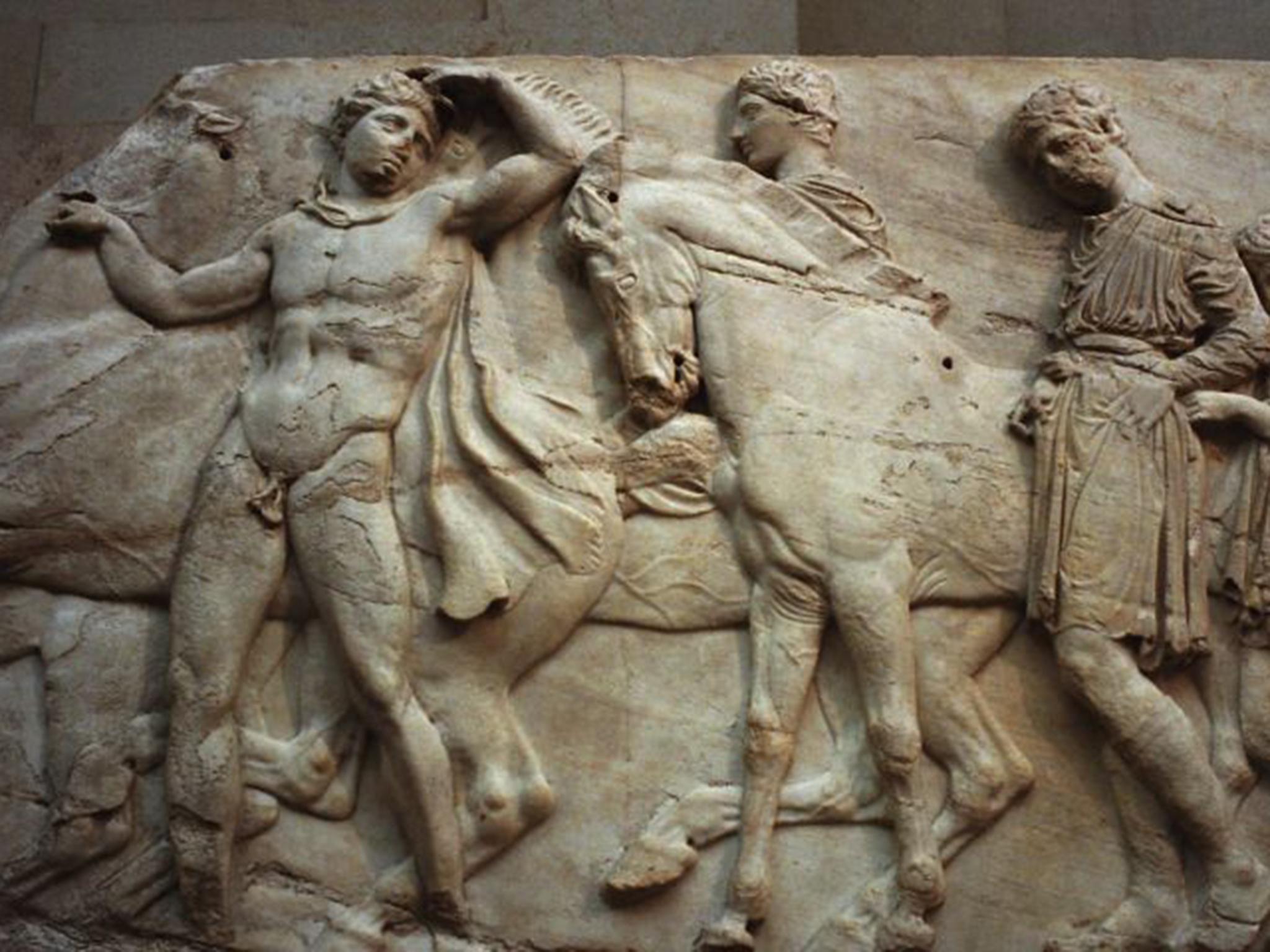MPs introduce Bill to return 'Elgin Marbles' to Greece 200 years after the UK decided to buy them
Campaigners say allowing the reunification of the sculptures kept in London with those still in Athens could be a diplomatic coup for the UK as it negotiates Brexit

Your support helps us to tell the story
From reproductive rights to climate change to Big Tech, The Independent is on the ground when the story is developing. Whether it's investigating the financials of Elon Musk's pro-Trump PAC or producing our latest documentary, 'The A Word', which shines a light on the American women fighting for reproductive rights, we know how important it is to parse out the facts from the messaging.
At such a critical moment in US history, we need reporters on the ground. Your donation allows us to keep sending journalists to speak to both sides of the story.
The Independent is trusted by Americans across the entire political spectrum. And unlike many other quality news outlets, we choose not to lock Americans out of our reporting and analysis with paywalls. We believe quality journalism should be available to everyone, paid for by those who can afford it.
Your support makes all the difference.A cross-party group of MPs has launched a fresh bid to return the so-called Elgin Marbles to Greece on the 200th anniversary of the British Government’s decision to buy them — a move that campaigners said could help the UK secure a better deal during the Brexit talks with the EU.
The issue has long been a source of tension between, on one side, the UK Government and British Museum, where the 2,500-year-old marbles are currently on display, and, on the other, Greece and international supporters of the reunification of the Parthenon temple's sculptures.
About half the surviving sculptures were taken from the Parthenon in Athens by Thomas Bruce, the seventh Earl of Elgin, and later bought by the British Government after parliament passed an Act that came into force on 11 July, 1816. The other half are currently in the Acropolis Museum in Greece.
The circumstances in which Lord Elgin removed about the sculptures are disputed, with some claiming he effectively stole them while Greece was ruled by the Ottoman Empire.
The Parthenon Sculptures (Return to Greece) Bill will be presented on the anniversary by Liberal Democrat MP Mark Williams, supported by Conservative Jeremy Lefroy and 10 other MPs from Labour, the SNP and Plaid Cymru.
Mr Williams said: “These magnificent artefacts were improperly dragged and sawn off the remains of the Parthenon.
“This Bill proposes that the Parliament should annul what it did 200 years ago. In 1816 Parliament effectively state-sanctioned the improper acquisition of these impressive and important sculptures from Greece.
“It’s time we engaged in a gracious act. To put right right a 200-year wrong.”

The sculptures are some of the finest ever created and the Parthenon is arguably Europe’s greatest monument. The French Romantic poet Alphonse de Lamartine once described it as “the most perfect poem ever written in stone on the surface of the earth”.
Greece has sought the return of the sculptures ever since victory in the War of Independence in 1832. During the war, Greek fighters even gave bullets to Ottoman soldiers besieged on the Acropolis because they were damaging the Parthenon by removing lead fittings to make ammunition after running out.
Andrew George, chair of the British Association for the Reunification of the Parthenon Sculptures, said the Parthenon sculptures were “some of the most remarkable antiquities on the globe” and people should be able to see them in one place.
They were also, he said, a national symbol of Greece.
“The issue has generated strong feelings in Greece and rightly so,” Mr George said. “We have to take seriously something which is clearly of great significance to the people of Greece.”
Polls have consistently shown that a majority of the British people support reunification. A poll for the The Times newspaper found the general public backed sending the marbles back to Greece by two to one. And an Ipsos-Mori poll found 69 per cent of those familiar with the issue were in favour of returning the sculptures, compared to just 13 per cent against.
Mr George said the case for returning the sculptures was stronger following the Brexit vote.
“If we are about the negotiate a decent trade deal with our European friends, the last thing we want to do is to show the kind of raspberries and two-fingers that [Nigel] Farage was displaying in the European Parliament the other day,” he said.
It would be in the British interest to demonstrate that leaving the EU “doesn’t involve us becoming inward-looking and xenophobic towards the EU, but more confident, more able to be gracious”
“And there could be no better demonstration of that generosity and graciousness than to do what would be the right thing by the Greeks,” Mr George said.
Professor Athanasios Nakasis, president of the Hellenic branch of the International Council On Monuments and Sites, said allowing reunification would mean a lot for his country, but would also be welcomed around the world.
“Emotionally, the return of the marbles to the place where the rest of the monument resides would be a source of pride for Greeks, since the Athenian Acropolis is an important symbolic centre of the modern nation,” he said.
“From the perspective of the International Council on Monuments and Sites, the reunification of the scattered fragments of the Parthenon would be a positive development, since one of the fundamental principles of our organisation is that the integrity of monuments ought to be preserved, both internally and with respect to their historical contexts.”
The British Museum argues that it "tells the story of cultural achievement throughout the world, from the dawn of human history over two million years ago until the present day".
"The Parthenon Sculptures are a vital element in this interconnected world collection. They are a part of the world’s shared heritage and transcend political boundaries," it says.
"The Acropolis Museum allows the Parthenon sculptures that are in Athens (approximately half of what survive from antiquity) to be appreciated against the backdrop of ancient Greek and Athenian history. The Parthenon sculptures in London are an important representation of ancient Athenian civilisation in the context of world history."
Under David Cameron, the UK Government has remained opposed to allowing the reunification of the Parthenon sculptures, which would require an Act of Parliament to change the laws governing the British Museum.
In 2011, he joked, predictably, that Britain was not going to "lose its marbles".
Join our commenting forum
Join thought-provoking conversations, follow other Independent readers and see their replies
Comments